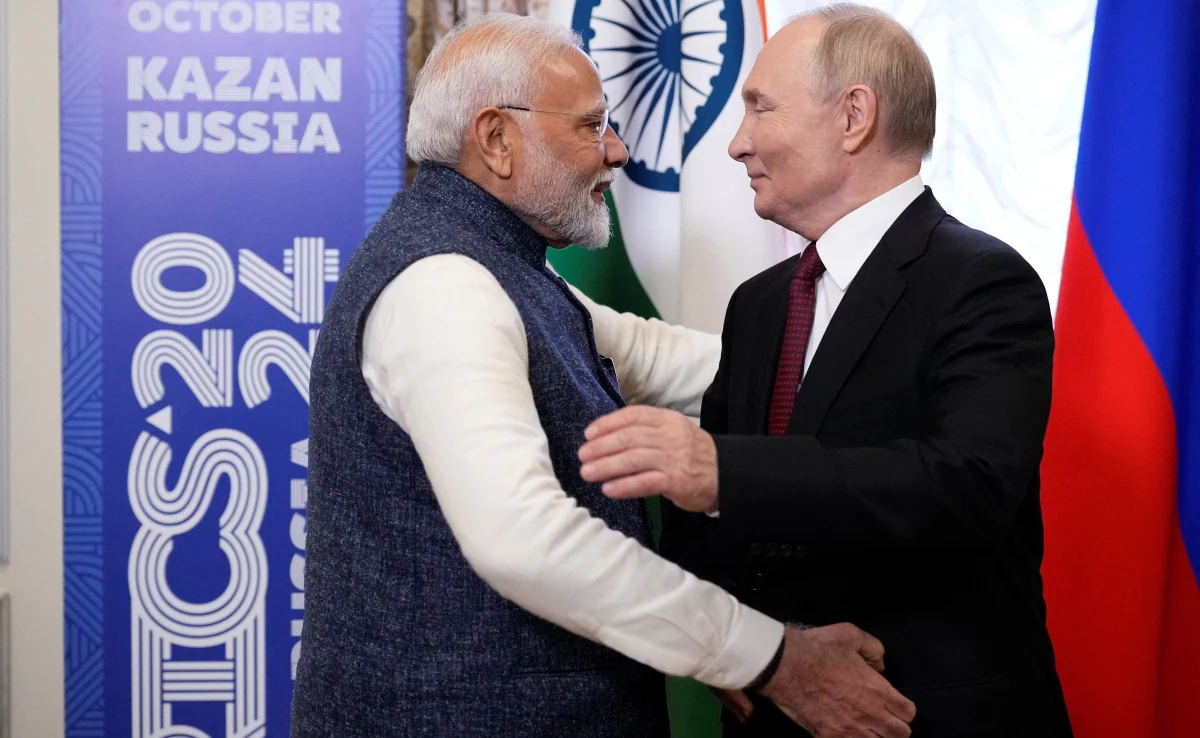Prime Minister Narendra Modi arrived in Russia on Tuesday to attend the BRICS Summit in Kazan. He had important discussions with Russian President Vladimir Putin. PM Modi is also expected to talk with Chinese President Xi Jinping and other global leaders during the summit. The summit, which focuses on “Strengthening Cooperation for Fair Global Development and Security,” starts today, and the main meetings will take place on Wednesday.
Before his visit, the government highlighted India’s important role in BRICS, noting that India’s contributions have helped shape the group’s work in areas like economic growth and global governance changes. Stay updated with India Today for detailed coverage of PM Modi’s important visit to Russia.
PM Modi’s Push For Peaceful Solution To Ukraine War
The BRICS Summit, which brings together the informal group of nations comprising Brazil, Russia, India, China, and South Africa, is taking place in Kazan, Russia. This summit is a significant gathering of the world’s leading emerging economies, each representing a large portion of the global population and economic activity. The BRICS bloc was originally formed with the aim of enhancing cooperation among these nations, focusing on mutual development, and promoting reform in global governance to better reflect the interests of developing countries.

During a significant moment at the BRICS Summit in Kazan, Russia, Prime Minister Narendra Modi expressed India’s firm belief in resolving conflicts through peaceful dialogue, specifically referring to the ongoing Russia-Ukraine conflict. The meeting between PM Modi and Russian President Vladimir Putin held on the sidelines of the BRICS Summit, became a key highlight of the event. The warmth between the two leaders was evident as they greeted each other with a hug, signaling the strong relationship that India and Russia have shared for decades.
India’s Call for Peaceful Solutions
Prime Minister Modi used this high-profile meeting to emphasize India’s position on the Russia-Ukraine war. He conveyed to President Putin that India believes all conflicts can and should be solved through dialogue and peaceful means. In his words, Modi reiterated, “We have been in touch with all sides in the Russia-Ukraine problem. It has always been our position that all conflict can be solved with dialogue. We believe there should be peaceful solutions to conflicts. India is always ready to help bring peace.” This statement reflects India’s long-standing diplomatic approach of advocating for dialogue as the path to resolving global disputes.

India, since the onset of the Russia-Ukraine conflict, has maintained a neutral stance, urging both parties to engage in peace talks while refraining from taking sides in the conflict. Despite global pressures, especially from Western powers, to condemn Russia’s actions more forcefully, India has pursued a more balanced approach, seeking to maintain its ties with Russia while advocating for peace. Modi’s comments during the BRICS Summit reaffirmed India’s commitment to diplomacy and peace, positioning the country as a potential mediator in global conflicts.
The BRICS Summit and Its Significance
The BRICS Summit, an annual gathering of five major emerging economies—Brazil, Russia, India, China, and South Africa—serves as a crucial platform for these nations to collaborate on issues of global importance. Held this year in Kazan, Russia, the summit comes at a time of significant geopolitical tension, especially in the wake of the Russia-Ukraine conflict, economic challenges post-pandemic, and shifting global alliances.
The theme of this year’s summit, “Strengthening Multilateralism for Just Global Development and Security,” underscored the importance of international cooperation in addressing the numerous challenges facing the world today. With each of the BRICS nations representing a large portion of the global population and economic output, the group aims to play a central role in shaping the future of global governance, pushing for reforms in international institutions such as the United Nations and the International Monetary Fund to reflect the interests of developing countries.
At this year’s summit, PM Modi praised the success of the BRICS bloc, noting that its influence continues to grow on the world stage. One of the notable aspects of this year’s event was the increasing interest of other nations in joining the BRICS group. Modi congratulated the BRICS members for their collective efforts, which have attracted the attention of many countries that wish to be part of the group. He emphasized that this growing interest demonstrates the success of the BRICS model in fostering cooperation and promoting development among its members. The potential expansion of BRICS has become a topic of conversation, with countries from different regions, such as Argentina and Saudi Arabia, expressing interest in becoming members of the bloc.